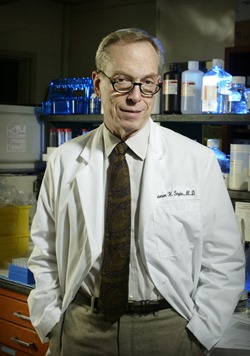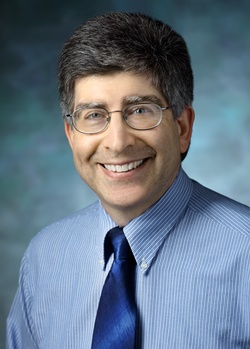 SOLOMON H. SNYDER, MD came to Johns Hopkins Hospital to complete his psychiatric training in 1965. In 1966 he joined the faculty of the Johns Hopkins University School of Medicine (Asst Professor Pharmacology, 1966-1968; Associate Professor Pharmacology/Psychiatry (1968-1970); Professor (1970). In 1980 he established the Department of Neuroscience and served as Director (1980-2006). He is presently Distinguished Service Professor of Neuroscience, Pharmacology and Psychiatry. Dr. Snyder is the recipient of numerous professional honors, including the Albert Lasker Award for Basic Biomedical Research (1978), the National Medal of Science (2005), the Albany Medical Prize (2007), Honorary Doctor of Science degrees from Northwestern University (1981), Georgetown University (1986), Ben Gurion University (1990), Albany Medical College (1998), Technion University of Israel (2002), Mount Sinai Medical School (2004), University of Maryland (2006), Charles University, Prague (2009), the Wolf Foundation Prize in Medicine (1983), the Dickson Prize of the University of Pittsburgh (1983), the Bower Award of the Franklin Institute (1991), the Bristol-Myers Squibb Award for Distinguished Achievement in Neuroscience Research (1996) and the Gerard Prize of the Society for Neuroscience (2000). He is a member of the United States National Academy of Sciences and a Fellow of the American Academy of Arts and Sciences and the American Philosophical Society. Dr. Snyder has authored more than 1,000 journal articles and several books including Uses of Marijuana (1971), Madness and the Brain (1974), The Troubled Mind (1976), Biological Aspects of Abnormal Behavior (1980), Drugs and the Brain (1986), and Brainstorming (1989).
SOLOMON H. SNYDER, MD came to Johns Hopkins Hospital to complete his psychiatric training in 1965. In 1966 he joined the faculty of the Johns Hopkins University School of Medicine (Asst Professor Pharmacology, 1966-1968; Associate Professor Pharmacology/Psychiatry (1968-1970); Professor (1970). In 1980 he established the Department of Neuroscience and served as Director (1980-2006). He is presently Distinguished Service Professor of Neuroscience, Pharmacology and Psychiatry. Dr. Snyder is the recipient of numerous professional honors, including the Albert Lasker Award for Basic Biomedical Research (1978), the National Medal of Science (2005), the Albany Medical Prize (2007), Honorary Doctor of Science degrees from Northwestern University (1981), Georgetown University (1986), Ben Gurion University (1990), Albany Medical College (1998), Technion University of Israel (2002), Mount Sinai Medical School (2004), University of Maryland (2006), Charles University, Prague (2009), the Wolf Foundation Prize in Medicine (1983), the Dickson Prize of the University of Pittsburgh (1983), the Bower Award of the Franklin Institute (1991), the Bristol-Myers Squibb Award for Distinguished Achievement in Neuroscience Research (1996) and the Gerard Prize of the Society for Neuroscience (2000). He is a member of the United States National Academy of Sciences and a Fellow of the American Academy of Arts and Sciences and the American Philosophical Society. Dr. Snyder has authored more than 1,000 journal articles and several books including Uses of Marijuana (1971), Madness and the Brain (1974), The Troubled Mind (1976), Biological Aspects of Abnormal Behavior (1980), Drugs and the Brain (1986), and Brainstorming (1989).
The Solomon H. Snyder Professorship in Neurosurgery
School of Medicine
Neurosurgery
Established in 2014 by an anonymous donor
Held by Michael J. Caterina
 MICHAEL J. CATERINA, MD, PhD is a Professor of Neurosurgery, Biological Chemistry and Neuroscience. He was recently named the inaugural Director of the Neurosurgery Pain Research Institute at Johns Hopkins. He is also a member of the Center for Sensory Biology and leads the Brain Sciences Institute’s Pain Working Group.
MICHAEL J. CATERINA, MD, PhD is a Professor of Neurosurgery, Biological Chemistry and Neuroscience. He was recently named the inaugural Director of the Neurosurgery Pain Research Institute at Johns Hopkins. He is also a member of the Center for Sensory Biology and leads the Brain Sciences Institute’s Pain Working Group.
Dr. Caterina earned his MD and PhD degrees from The Johns Hopkins School of Medicine in 1995. Since he joined the Johns Hopkins faculty in 1999, Dr. Caterina and his colleagues have used gene knockout mice to evaluate the potential contributions of other heat-stimulated ion channels to heat and pain sensation, have studied the biophysical changes exhibited by TRP channels during persistent stimulation, and have discovered that even non-neuronal cells, like the epithelial cells that line the skin, may play a role as “first responders” to painful environmental stimuli and communicate the presence of these stimuli to the nervous system. The Caterina lab has also been collaborating with other labs at Johns Hopkins to examine the relative importance of different subpopulations of sensory neurons to the onset and maintenance of chronic pain and to develop new methods and reagents that will allow pain sensitivity and the underlying cellular mechanisms to be better quantified. Dr. Caterina’s work has been recognized with a number of national and international awards, including the Patrick Wall Young Investigator Award from the International Association for the Study of Pain in 2005 and the Donlin M. Long Pain Service Award from the Johns Hopkins Blaustein Pain Research Program in 2013.